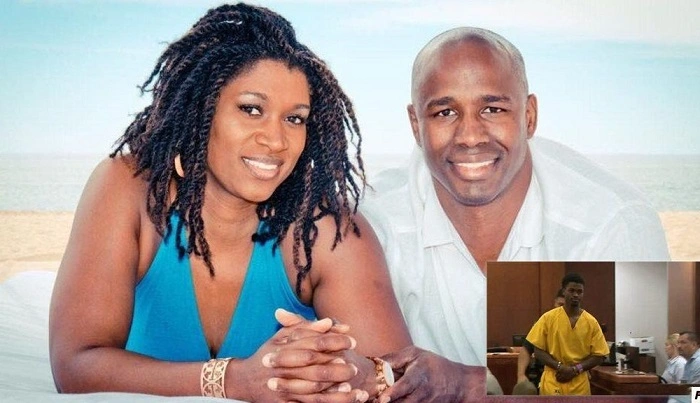AJ Armstrong’s name was making the headlines in America following a horrific family tragedy in 2016. A night out on the town in Houston became one of the most bizarre murder trials in the state of Texas. AJ had the chance to live and tell the whole story about it in three trials, two trials, and then, seven years later, a conviction. The trial was on the front pages because it was emotionally charged, featured the best of the best evidence, and stirred controversy about justice, family, and religion.
Who Is AJ Armstrong
Antonio “AJ” Armstrong Jr. came from a prosperous happy household. His dad, Antonio Armstrong Sr., was a prosperous businessman and retired NFL player as an American football athlete. His mom, Dawn Armstrong, was a jovial nurturing mother. AJ had spent his formative years in what seemed to be a utopian moment family in Houston, Texas.
And then disaster struck in July 2016, when AJ was 16. His two parents were shot and killed in the home, both of them in bed. Hours later, AJ was the prime suspect. It was a case that everyone in the country was discussing and being covered on networks all over the country.
The Crime and the Investigation
Police were called by AJ after he had dialed 911 and told them that he heard a faint noise of a shot. Following his parents’ deaths on the floor in the bedroom when the investigators arrived, the investigators found a weapon at his home as well as some evidence pointing against AJ. The detectives accused the crime scene of not cooperating with his alibi.
The case itself was always complicated. Motivation, proof, and timing all came under scrutiny. AJ’s fingerprints and DNA took center stage on the case, but everyone complained the case was hardly so black and white.
AJ had always possessed the denial. He said that he loved his parents and never harmed them. The police didn’t believe him, however, where proof was required, and AJ was arrested and charged with killing them.
The Long Road to Justice
AJ Armstrong’s trial was adjourned three times before the verdict was actually delivered.
The First Trial
AJ’s initial trial had taken place in 2019. The jurors were not like minds and share the same view, and therefore a mistrial had been declared.
The Second Trial
The second trial in 2022 also resulted in a hung jury. The majority believed that the evidence was too complicated and raised too many questions in their minds.
The Third Trial
In 2023, finally after all the fluctuations of emotions high and low, AJ’s third trial ended. He had been convicted by his jury for the murder of his parents. Since he committed the offense when he was underage, he was sentenced to life imprisonment with parole after 40 years.
The people were not content with the verdict up to that point. While some of them believed that justice had been meted out, there were others who were not confident regarding the verdict.
Life After the Verdict
AJ was incarcerated in Texas after sentencing. During his interviews, he vowed that prison changed him. He became a convert to religion and inner peace was achieved, asserting it gave space for ideas and being close to God. To him, he still believed that he was wrongly convicted.
AJ’s wife, who had remained with him all along, finally demanded a divorce, stating that the years of court and frustration were enough. But she did add that she did hope AJ had learned and found peace.
A.J. speaks of religious faith and personal change even when he was imprisoned. He says he would like to encourage others who have experienced loss and despair.
Why AJ Armstrong’s Case Is Significant
It’s such a big case on so many different levels. It’s not even a crime, it’s a people’s story. It illustrates just how quickly things can get out of hand in a minute’s time and how slowly justice ultimately catches up.
Why the Case Was So Populist:
• The public image of the family served to make the tragedy all the worse
• AJ was just 16 years old
• Three trials, new evidence and new emotions each time
• Fatigued youth justice and justice
• Demonstrated that assumptions will still reign supreme in worst case situations
AJ’s situation had us all thinking about what justice is and how the truth comes out decades later.
Key Themes and Lessons
- Adolescents and Consequences
AJ’s life shows how a moment can decide a life. He was accused of something at age 16 that even most adults can hardly even imagine. It made one understand how juveniles are treated in the criminal justice system. - Family and Tragedy
The Armstrong family seemed close and tight. His example teaches that even with such loving, close families maybe sinless families with issues that would be apparent. - Redemption and Faith
AJ testified after a half century of captivity and torture that religion stayed his hand. Guilty or not guilty, religious redemption of healing can arguably be performed anywhere. - Justice and Uncertainty
There were three trials that illustrated how justice was made complicated. Evidence, memory, and suspicion could all point to the truth in some form or another for both sides.
Advantages of Case Coverage
- It created controversy in extending juvenile crime.
• It introduced imbalances in the criminal justice system.
• It introduced emotional and psychological problems among young people.
• It proved that religion and resilience actually could be formed after torture.
Also Read: Skin Booster Guide in Singapore: Profhilo, Juvelook, and Rejuran Explained
Weaknesses and Criticisms
- The media coverage also was sensationalized and emotional.
• Sometimes there would be incomplete or circumstantial information.
• Families were emotionally exhausted after the prolonged trial process.
• Everyone feels that the whole truth would never come out.
All these aside, the case changed the social mindset towards young people, justice, and mercy.
Interesting Facts
- The crime was committed in 2016 but the recent guilty verdict was submitted in 2023.
• AJ’s father was a football icon.
• There were two prior trials prior to the recent guilty decision, and the two trials produced mistrials.
• Since AJ was still a juvenile, he could not be incarcerated on death row.
• 40 years of his tenure in prison may go by before he is paroled.
• Even in prison, AJ has been trending on religious memes about subjects of redemption.
Public Opinions
Supporters
Most people believe that AJ is innocent and evidence was not too strong to convict him. They believe hung juries and paradoxes were present for decades as a mark of doubt.
Critics
Some believe justice has been done. They believe physical evidence and eyewitness testimony all pointed to guilt.
Others
Some believe the case is sad for everyone. Two lost their lives, one was sent to prison, and a whole family was ruined.
FAQs
Q1. What was the sentence?
He received life with parole possibility after 40 years.
Q2. Did AJ confess?
No. Never did.
Q3. Why did it go to three trials?
The first two juries didn’t agree and thus mistrials were conducted. Conviction was only in the third trial.
Q4. What does AJ have to say now?
He has to say that he took his fate on trust but still claims innocence.
The Bigger Picture
AJ Armstrong’s tale is a front page headline in the newspaper. It reminds us that justice never comes directly and that every story has numerous sides to it. It is a tragedy of reconstruction of a town and how a single act can turn the lives of an infinite number of people around.
It also places human beings at a place of being merciful even if they are less certain. Whether one believes AJ is innocent or guilty, his case leaves us all hanging to consider how benevolent and fair society can be.
The tale of AJ Armstrong will never be left out just because it is tragic, but also because it has morality in itself. It reminds us of two aspects of the truth, justice always follows late, and hope is ever present even in total despair.
With tragedy, with sorrow, with theatre on trial for decades, AJ’s trial is now a celebration of justice in the twenty-first century and human beings’ determination. However things stand, AJ Armstrong’s trial still ruffles your feathers, raises an eyebrow, and reminds us all how slippery life is.
Call to Action: AJ Armstrong’s case is a call to examine more deeply our treatment of child criminals and how our faith, family, and forgiving spirit define us in times of tragedy.



